رنئ دکارت
(رنه دکارت-دن يوْللاندیریلمیش)
رنئ دکارت (فرانسیزجا: René Descartes؛ ۳۱ مارس ۱۵۹۶ - ۱۱ فوریه ۱۶۵۰)، فرانسهلی فیلسوف، ریاضیچی و بیلیم آدامی ایدی. دکارت داها اؤنجه بیربیریندن آیری اوْلان جبر و هندسهنی بیرلشدیریب و تحلیلی هندسهنین موخترعی اوْلاراق تانینیر. دکارت مودرن فلسفهنین قوروجولاریندان بیری و اوْنون آتاسی اوْلاراق آدلاندیریلیر.[۱۶] دکارت فلسفهسینین چوخلو عونصورلرینین گئج ارسطوچولوقدا اؤرنکلرینی گؤرمک اوْلار.
اتک یازیلار
دَییشدیر- ^ Although the uncertain authorship of this most iconic portrait of Descartes was traditionally attributed to Frans Hals, there is no record of their meeting. During the 20th century the assumption was widely challenged.[۱]
- ^ ۲٫۰ ۲٫۱ Étienne Gilson argued in La Liberté chez Descartes et la Théologie (Alcan, 1913, pp. 132–147) that Duns Scotus was not the source of Descartes's Voluntarism. Although there exist doctrinal differences between Descartes and Scotus "it is still possible to view Descartes as borrowing from a Scotist Voluntarist tradition".[۱۲]
قایناقلار
دَییشدیر- ^ Nadler, S., The Philosopher, The Priest, and The Painter (Princeton, NJ: Princeton University Press, 2013), pp. 174–198.
- ^ Tad M. Schmaltz, Radical Cartesianism: The French Reception of Descartes, Cambridge University Press, 2002, p. 257.
- ^ Fumerton, Richard (21 February 2000). "Foundationalist Theories of Epistemic Justification". Stanford Encyclopedia of Philosophy. 19 August 2018-ده یوخلانیب.
- ^ Bostock, D., Philosophy of Mathematics: An Introduction, Wiley-Blackwell, 2009, p. 43: "All of Descartes, Locke, Berkeley, and Hume supposed that mathematics is a theory of our ideas, but none of them offered any argument for this conceptualist claim, and apparently took it to be uncontroversial."
- ^ Gutting, Gary (1999). Pragmatic Liberalism and the Critique of Modernity. Cambridge University Press. p. 116. ISBN 9780521649735.
Modernity begins with Descartes's mutation of Augustinianism. Taylor emphasizes that "Descartes is in many ways profoundly Augustinian".
- ^ Yolton, J. W., Realism and Appearances: An Essay in Ontology, Cambridge University Press, 2000, p. 136.
- ^ "The Correspondence Theory of Truth" (Stanford Encyclopedia of Philosophy)
- ^ Gaukroger, S., Descartes: An Intellectual Biography, Clarendon Press, 1995, p. 228.
- ^ Marenbon, John (2007). Medieval Philosophy: an historical and philosophical introduction. Routledge. p. 174. ISBN 978-0-415-28113-3.
- ^ H. Ben-Yami, Descartes' Philosophical Revolution: A Reassessment, Palgrave Macmillan, 2015, p. 76.
- ^ H. Ben-Yami, Descartes' Philosophical Revolution: A Reassessment, Palgrave Macmillan, 2015, p. 179: "[Descartes'] work in mathematics was apparently influenced by Viète's, despite his denial of any acquaintance with the latter's work."
- ^ John Schuster, Descartes-Agonistes: Physico-mathematics, Method & Corpuscular-Mechanism 1618–33, Springer, 2012, p. 363, n.. 26.
- ^ Mercer, C., "Descartes' debt to Teresa of Ávila, or why we should work on women in the history of philosophy", Philosophical Studies 174, 2017.
- ^ Craig, D. J., "She Thinks, Therefore I Am", Columbia Magazine, Fall 2017.
- ^ "Jacques Bénigne Bossuet, French prelate and historian (1627–1704)" from the Encyclopædia Britannica, 10th Edition (1902)
- ^ Bertrand Russell (2004) History of western philosophy pp. 511, 516–17.
